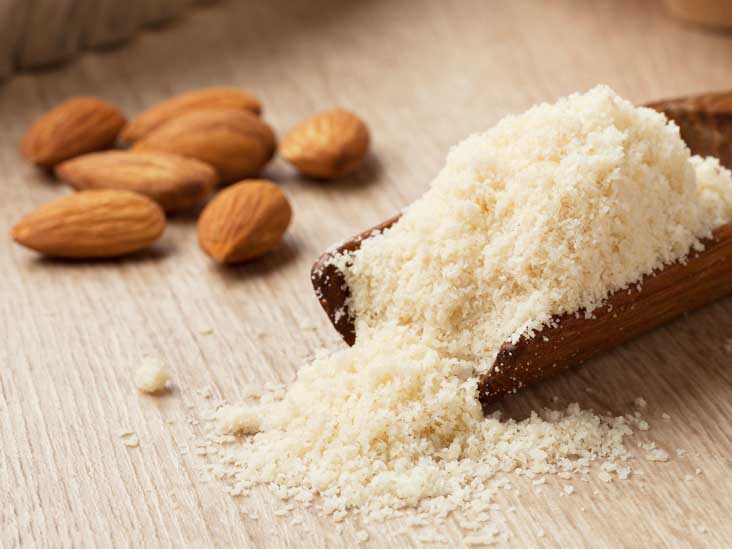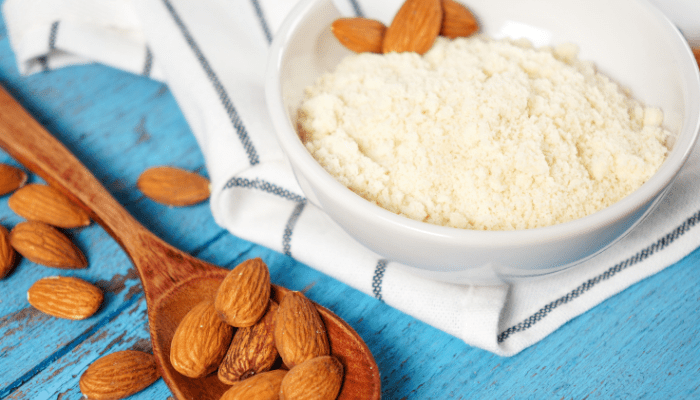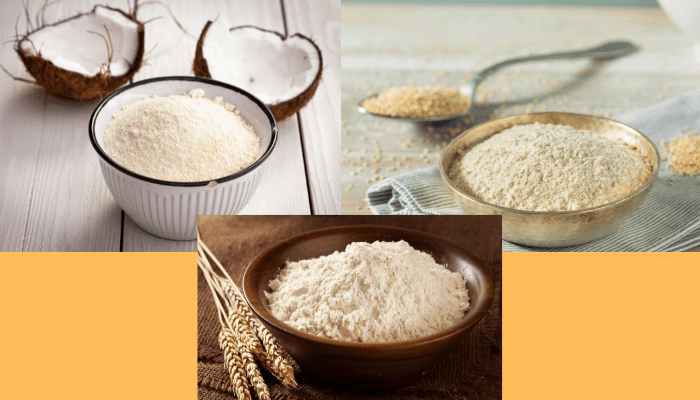Do you want to give your dog a special treat but aren’t sure what food is safe for them? Almond flour might be the perfect solution. It’s not only delicious but also offers numerous nutritional benefits that are great for your pup. This article will cover everything you need to know about almond flour and whether or not it can be safely given as a treat to dogs.
In addition, we’ll outline some of the health benefits associated with providing almonds, discuss potential risks associated with eating almond flour and discuss proper portion sizes so that you can feel secure in giving your pup an occasional almond-based snack or treat. So if you’ve been wondering – “can my dog have almond flour?” – keep reading.
Can Dogs Have Almond Flour?
Almond flour can be an occasional treat for your pup but should never make up a large portion of their diet. It’s important to note that almonds are high in fats, which means consuming too much almond flour can lead to digestive complications.
Additionally, some dogs may be allergic or intolerant to almond flour and other nuts. Therefore, if you want to feed almond flour to your pup, it’s best to consult your veterinarian.

What is Almond Flour?
Almond flour is a finely ground powder made from blanched almonds that have had their skins removed. It has a slightly sweet flavor and contains essential vitamins, minerals, and healthy fats that benefit humans. Almonds are also high in protein, fiber, and magnesium, making them an excellent choice for those looking to add some nutrition to their diet.

Can Dogs Eat Almonds?
Almonds can be a healthy snack for dogs in moderation. However, while almonds contain beneficial vitamins and minerals, they are high in fat, leading to digestive issues or even a health risk of pancreatitis if eaten in large quantities. Before giving your pup almonds as a treat, please consult your vet, as they might have more specific recommendations based on your dog’s breed and size.
Health Benefits of Almond Flour for Dogs
The biggest benefit of adding almond flour to your dog’s diet is its high content of healthy fats. Healthy fats like those found in almond flour are important for maintaining healthy skin, coat, and muscle development.
Additionally, almond flour is full of fiber which helps keep your dog regular and supports a healthy digestive system. Fiber also helps regulate blood glucose levels which can be especially beneficial for dogs with diabetes or other metabolic disorders.
Almond flour also contains essential vitamins such as Vitamin E, which boosts immune system functioning, promoting overall good health in your

Is Almond Flour Toxic to Dogs?
Is almond flour safe for dogs? The short answer is yes—dogs, in moderation, can safely consume almond flour as an occasional treat or snack. However, it should not be used as a substitute for high quality dog foods.
Almonds contain high levels of phosphorus and calcium, which can interfere with the absorption of other nutrients if eaten in large quantities. Additionally, almonds are high in fat which can cause digestive issues if consumed in excess by pets who are overweight or have sensitive stomachs. As always, check with your vet before giving your pet any new treats or snacks.
When feeding almond flour to your dog, it’s crucial to ensure that you only use unseasoned and unsalted products so that they don’t consume added ingredients like sugar or salt, which could harm their health.
Additionally, because nuts can pose a choking hazard when eaten whole by pets, you should always ensure that the almond flour you give them is finely ground so that there aren’t any large chunks that could pose a danger if swallowed whole by your pup.

How is Almond Flour Harmful to Dogs?
The biggest concern when feeding almond flour to dogs is the potential toxicity of almonds themselves. Dogs cannot digest almonds properly, and consuming too many can lead to gastrointestinal distress, such as vomiting and diarrhea.
Additionally, some evidence suggests that eating large amounts of raw almonds could even cause more severe health issues like pancreatitis or even death in some cases.
So while almond flour may seem like a harmless treat for your pup, it’s important to remember that it can be dangerous if consumed in large quantities.
Allergies & Intolerances
Another issue when you feed your dog almond flour is allergies and intolerances – both of which can occur when introducing new foods into their diet too quickly or without proper preparation.
Dogs tend to be especially sensitive when it comes to nut-based products because they often contain high levels of proteins that are hard for their bodies to break down and digest properly.
Suppose your dog has any known allergies or intolerances. In that case, you should avoid giving them any nut-based product – including almond flour – as this could lead to serious health problems or even death if left untreated.
Almond Flour Poisoning
Signs & Symptoms: Almond flour poisoning in dogs is caused by the amygdalin compound found in raw almonds. When this compound breaks down inside a dog’s body, it releases cyanide, leading to various symptoms, including vomiting, diarrhea, excessive salivation, and breathing problems. In severe cases, almond flour poisoning can lead to seizures, coma, or even death.
Treatment & Prevention: If your dog exhibits any of the above symptoms after eating almond flour, contact your vet immediately. Your vet will likely induce vomiting to remove as much almond flour as possible from your dog’s system before giving them an intravenous injection with an antidote for cyanide poisoning. It’s important to note that the quicker you act when your dog has eaten almond flour, the better their chances are for full recovery with minimal side effects.
Can Dogs Eat Treats With Almond Flour?
Yes, dogs can eat treats with almond flour and even almond butter. While almonds can be toxic to some animals (including cats), they are not harmful when consumed by dogs in the form of almond flour. In addition, almond flour can provide several health benefits for your pup, including improved digestion, weight management, and better skin health.
Be sure to look for quality almond flour explicitly made for baking dog treats since this flour will be free from preservatives and other additives that may be unhealthy for your pup. When in doubt, check with your vet before introducing any new food into your dog’s diet.

Can I Use Regular Flour for Dog Treats?
No! Regular all-purpose wheat flour should not be used in any dog treat because it does not contain the same full nutritional value as almond flour. Additionally, wheat flour can cause digestive upset in dogs due to its lack of dietary fiber, leading to vomiting or diarrhea if consumed in large amounts.
It’s always best practice to avoid feeding your dog with regular wheat flour when making homemade dog treats, so your pup stays safe and healthy.
Can Dogs Consume All-purpose Flour?
The short answer is no. While all-purpose flour is not toxic to dogs, overeating can cause digestive issues like vomiting and diarrhea. Because it contains gluten, wheat flour can also lead to allergic reactions in some dogs, causing discomfort and long-term health problems.
Additionally, if your dog consumes raw dough made from all-purpose flour, it could experience gas buildup due to the yeast in the dough. This can lead to stomach pain and bloating.
What Flour is Best for Dog Treats?
To help you make an informed decision, let’s look at three popular types of flour and their benefits when used for dog treats.
Coconut Flour
Coconut flour is made from dried coconut meat and often contains fewer carbohydrates than wheat flour. It’s also high in fiber and protein, making it an ideal choice for dogs with sensitive stomachs or allergies same with whole grain flours. Coconut flour also helps make treats more palatable by providing a subtle sweetness that dogs love.
Quinoa Flour
Quinoa is a nutrient-rich grain that contains essential amino acids, vitamins, minerals, and antioxidants. Quinoa flour is especially beneficial because it’s gluten-free, which makes it perfect for dogs with gluten sensitivities or allergies. It also provides complex carbohydrates that help sustain energy levels.
Whole Wheat Flour
Whole wheat flour is one of the most common types used in baking because it has a mild flavor and adds texture to baked goods. It is a perfectly good choice for homemade dog treat recipes. It’s also high in fiber, which helps keep your pup’s digestive system healthy. Just be sure to avoid whole wheat pastry flour because it can contain too much sugar for dogs with sensitive stomachs or diabetes.

Final Thoughts
In conclusion, can dogs have almond flour? Yes, they can! Almond flour can be beneficial for dog treats because it contains several essential vitamins and minerals that can improve your pup’s health.
Be sure to use quality almond flour for baking dog treats to ensure your pup gets the most nutrition from each bite. Additionally, when in doubt, check with your vet before introducing any new food into your dog’s diet.
Frequently Asked Questions
Which flours are safe for dogs?
Treat your pup to a tasty and nutritious dish with this simple recipe for dog food stuffed with flour! Whole wheat, oatmeal, almond, and chickpea flours provide a variety of essential nutrients, vitamins, and minerals necessary for canine health. With this versatile mix of ingredients, you can whip up a delicious dish your furry friend will love.
Can dogs eat almond flour or coconut flour?
Switch up your pup's treats with a new and tasty recipe featuring coconut flour! Coconut flour provides the same health benefits as almond flour – it's gluten-free, high in protein and fiber, and makes for tasty treats that your canine companion will love. Have fun experimenting with ingredients to find the perfect combination for your furry friend.
Can dogs have almond flour pancakes?
While many dogs love the taste and texture of almond flour, it can be potentially hazardous for dogs with an allergy to almonds. If you want to share an almond flour pancake recipe with your pet, consult your veterinarian first. They may also be able to recommend a substitute flour that will work just as well in the recipe without causing any allergic reaction.
Will one almond hurt my dog?
Overindulging in almond milk can cause severe digestive complications for your pup. Symptoms such as vomiting, diarrhea, abdominal cramps, lethargy, and bloating can result from overeating almond milk – even just 1-2 servings! So if your pooch enjoys almond milk, limiting their intake is best to ensure their stomachs stay healthy and happy.





